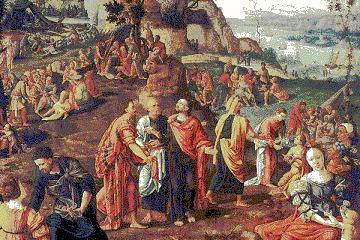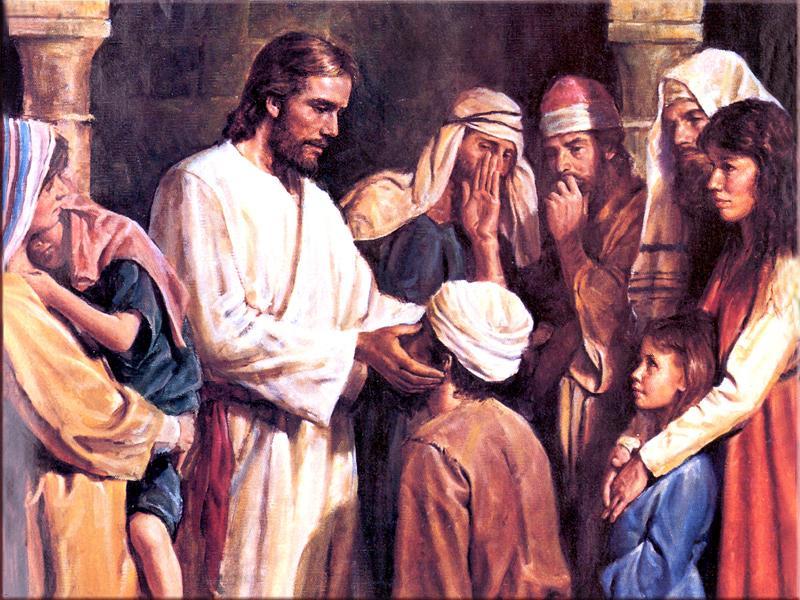Mark 8:1-21
During
those days another large crowd gathered. Since they had nothing to eat, Jesus
called his disciples to him and said, 2 “I have compassion for these
people; they have already been with me three days and have nothing to eat. 3 If
I send them home hungry, they will collapse on the way, because some of them
have come a long distance.”
4 His
disciples answered, “But where in this remote place
can anyone get enough bread to feed them?”
5 “How many loaves do you have?”
Jesus asked.
“Seven,” they replied.
6 He told
the crowd to sit down on the ground. When he had taken the seven loaves and
given thanks, he broke them and gave them to his disciples to distribute to the
people, and they did so. 7 They had a few small fish as well; he gave thanks
for them also and told the disciples to distribute them. 8 The people ate and
were satisfied. Afterward the disciples picked up seven basketfuls of broken
pieces that were left over. 9 About four thousand were present. After he had
sent them away, 10 he got into the boat with his disciples and went to the
region of Dalmanutha.
11 The
Pharisees came and began to question Jesus. To test him, they asked him for a
sign from heaven. 12 He sighed deeply and said, “Why
does this generation ask for a sign? Truly I tell you, no sign will be given to
it.” 13 Then he left them, got
back into the boat and crossed to the other side.
14 The
disciples had forgotten to bring bread, except for one loaf they had with them
in the boat. 15 “Be careful,” Jesus warned them. “Watch out for the yeast of the
Pharisees and that of Herod.”
16 They
discussed this with one another and said, “It is because we have no
bread.”
17 Aware
of their discussion, Jesus asked them: “Why are you talking about
having no bread? Do you still not see or understand? Are your hearts hardened?
18 Do you have eyes but fail to see, and ears but fail to hear? And don’t you remember? 19 When I broke the five loaves for the
five thousand, how many basketfuls of pieces did you pick up?”
“Twelve,” they replied.
20 “And when I broke the seven loaves for the four thousand,
how many basketfuls of pieces did you pick up?”
They
answered, “Seven.”
21 He
said to them, “Do you still not understand?”
No, I
didn't make a mistake and repost an old story.
This is in fact another mass feeding by Jesus. And that is where the questions begin. Why would Mark have such similar stories in
his most compact of the gospels? Surely
he would have recognized the similarity between this and the feeding of chapter
6.
But there
are differences, not in the story's essentials but in their details. The plot line is the same. A crowd is with Jesus, and lacking anything
to eat, Jesus tells the disciples to feed them.
When they express exasperation, Jesus takes a small amount of food,
blesses it and breaks it with enough resulting leftovers that baskets are
filled.
This time
it is Jesus who notices that the crowd is hungry. He does not ask them to give the masses
something to eat, but they are quick to remind Jesus that just as before they
are in a remote place and there is no food in evidence. That the disciples have doubt at this point
seems incredulous, but it may be Mark showing us that the disciples have
trouble even with the Syrophnecian woman and the deaf mute behind them
believing that Jesus would use his power to help gentiles.
The
numbers vary significantly between the stories.
The first crowd is only with him a day, while this crowd has gone three
days, perhaps without eating. In the
earlier story it is five loaves and two fish given to five thousand with twelve
baskets of leftovers. Here it is seven
loaves and some fish given to four thousand with only(!) seven baskets of
leftovers.
Commenters
have struggled mightily over the possible significance of these numbers. The crowd in this story has been with Jesus
for three days, which is the amount of time that Jesus will spend in the
grave. Is this second telling a story
intended to bring in mind communion after the resurrection? Does the hunger of the crowd mirror the
hunger of the disciples waiting for Jesus to reappear?
Many have
suggested that the twelve baskets of leftovers symbolize God's abundance for
the people of Israel. The five loaves
and the five thousand gathered represent the five books of the Torah and thus
the nation of Israel. Seven, on the
other hand is the number of completion and seventy was believed to be the
number of gentile nations. Do the seven
loaves suggest that just as Jesus has first fed the Jews, now his ministry has
expanded to the gentiles. For the more
acrobatic numerologists, the crowd of four thousand represents the four gospels
that have become the most important scriptures of the Christian tradition.
Jesus
concern about the people collapsing on their way home is another
difference. It seems to draw attention
to the fact that these are people who have come a long way. This makes them good representatives of the
foreign nations. In addition, the two
previous stories have highlighted healings that are similar to those done
already in Jewish territory. It seems
clear that Mark wants us to understand that Jesus ministry extended to all
peoples not just the Jews of Judea.
This time
when Jesus feeds the crowd, he dismisses them and gets on the boat with the
disciples rather than sending them on their own. The focus on food/Jesus continues as the
disciples despair that they have not brought the leftovers with them and their
hunger pangs grow. Jesus sensing their
discomfort decides to make a point and tells them to beware the yeast of the
Pharisees and of Herod. Yeast/leaven, unlike
today, was considered to be unclean. It
seems another reminder of Jesus expanded mission. He has declared all foods clean (even those
with yeast) and has fed and come into close contact with Gentiles. Did the disciples not eat at the feeding of
the four thousand for fear of impurity?
That might explain why they hunger now!
What leaven/yeast uncleanness should they fear? Not that of the gentiles, but of the
religious leaders and political leaders of their own land that have tried to
limit God's action to people like them.
But any
abstract lesson is too much for these disciples. They can't get past their bellies and see no
meaning in what Jesus says other than that they have no bread. They are of course wrong because Mark tells
us they have one loaf. This bread is
either Jesus and his abundance or a literal loaf which if it is broken by Jesus
has been shown to be enough to feed hundreds with a basket or more of
leftovers. They have no cause for worry!
And so
Jesus talks them through the duplicate miracles again after asking if they have
hardened hearts (which is indeed the case).
He calls on them to remember the feeding of the five thousand among the
Jews. He calls on them to remember the
feeding of the four thousand among the gentiles.
And his question
is the same as ours. Do you still not
understand?



